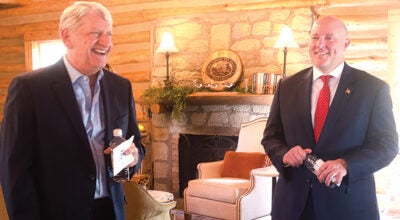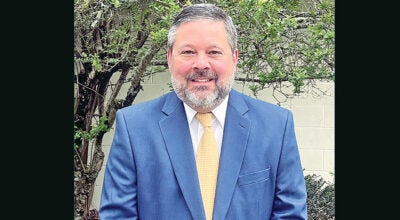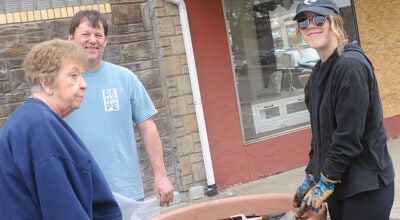Ready for redevelopment
Published 10:15 am Friday, December 13, 2013
Local officials are taking a hard look at what could become of a 24-acre commercial development property in Ironton.
The Industrial and Commercial Committee of the Ironton City Council met prior to council’s regular meeting on Thursday and heard from Lawrence Economic Development Corporation Executive Director Bill Dingus about possibly developing the old Ironton Iron Inc. lot on South Third Street.
“(The LEDC) would like to put some type of commercial campus on this property,” Dingus told the committee. “A place with shared businesses, shared loading docks or conference rooms.”
Dingus notified the committee of the LEDC’s interest on the heels of receiving a letter from the Ohio EPA that relayed positive and encouraging news. Erin Strouse wrote that an investigation and remediation through the EPA’s Voluntary Action Program (VAP) caused the agency to issue a covenant not to sue and declare the “brownfield” ready for development.
Dingus asked that the committee recommend to council the property be transferred from the City of Ironton to the Lawrence County Port Authority.
“We have a good, united partnership,” Dingus said. “I ask that the property be transferred — with all benefits and liabilities — to the port authority.”
The port authority would then, Dingus said, transfer the property to the LEDC. Committee member Aaron Bollinger made the motion to recommend the property transfer to council with committee members Dave Frazer and Beth Rist also in favor.
Talk of the Ironton Iron property resurfaced during the regular meeting of council when City of Ironton Finance Director Kristen Martin asked council to make a concerted effort to look at income tax agreements prior to transferring the property.
“If I remember correctly any income tax revenue collected from that property will go to the LEDC for five years for future development,” she said. “I’ll have to check on that but I think because (the city) own(s) the property 100 percent of income tax goes to (the LEDC).”
Bollinger told Martin he thought the agreement would give only 50 percent of income tax revenue to the LEDC and the other half would go to the city.
“We for sure need to look at that,” Kevin Waldo, council chairman, said. “We definitely don’t want to give up the property and the tax revenue. Although we are extremely interested in developing that property and entering into a package with the LEDC, it’s not going to be at a 100 percent income tax rate.”
Bollinger mentioned some instances when business moved into Ironton and were given a tax incentive, then moved out when it came time to start paying school taxes.
“Back to New York,” Waldo added.
In other business, Ironton Mayor Rich Blankenship told council about several complaints from residents on and near McPherson Street about train whistles.
“I have spoken to the people at the railroad and was told new railroad rules require the whistle to be blown at every crossing,” he said. “He told me the railroad is obviously going to err on the side of safety.”
Waldo said the whistles he has heard are “deafening.”
There is a “Quiet Zone” concept in regard to train whistles, Blankenship said, but getting it established is an arduous process with many rules and regulations, as well as a $2,800 fee.
“I live three blocks away from the railroad tracks and sometimes it rattles the pictures on my walls,” Bob Cleary, council member, said. “It might be worth paying the $2,800 to get that done.”
After adopting ordinance 13-71 authorizing the mayor to enter into an agreement with E.L. Robinson Engineering Company, council member Craig Harvey asked Blankenship for a favor.
“Could you ask whoever is doing work on the streets in town to notify people or the newspaper so it can notify people when they are going to shut down a street?” Harvey asked. “Instead of letting people know, they just throw up cones and block it off.”
Blankenship said he has had trouble getting some companies — Columbia Gas in particular – to notify his office of temporary street closures.
“If they let me know at all is it usually at the last minute,” Blankenship said. “I have told Columbia Gas and AEP that they have to give some notice so I can make the public aware.”
Waldo said he has noticed alleys getting closed off more often downtown as well. “People use those alleys a lot,” he said.
The three-reading rule was suspended and ordinances subsequently adopted for:
13-76 – amending the annual operating budget;
13-78 – authorizing and directing the mayor to enter into a contract with Ohio University Southern for police patrol;
13-79 – rescheduling council’s regular meeting from 6 p.m. Thursday, Dec. 26, to 6 p.m. Monday, Dec. 23 because of Christmas. The finance committee will meet at 5:30 p.m. on Dec. 23 as a result; and
13-82 – authorizing the mayor to accept a bid from Allard Excavating for the Storms Creek Bike Trail Project.
Ordinance 13-80 authorizing the mayor to award bids for chemical purchases had its first reading, as did ordinance 13-83 for concrete bids. Ordinance 13-74, which adopts a temporary budget for the City of Ironton had its second reading and ordinance 13-72 to enter into an agreement with E.L. Robinson for phase III of the South Ironton Sewer Separation Project had its third reading and was adopted.
Council also approved resolution 13-81 to apply for Ohio Natureworks funding.
Cleary was appointed by council as its representative on the board of Ironton aLive and Rist is council’s backup appointment.





